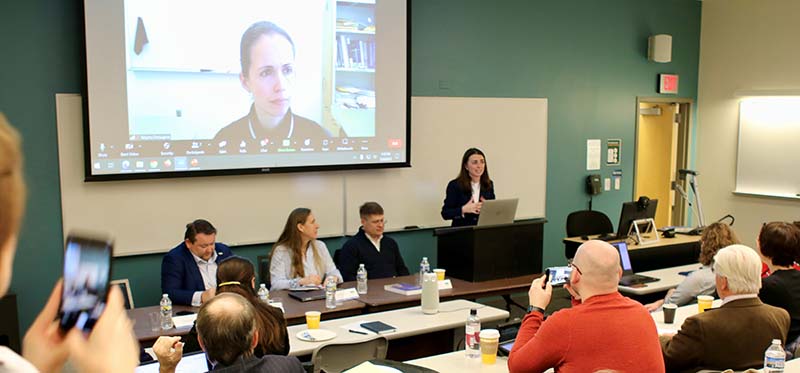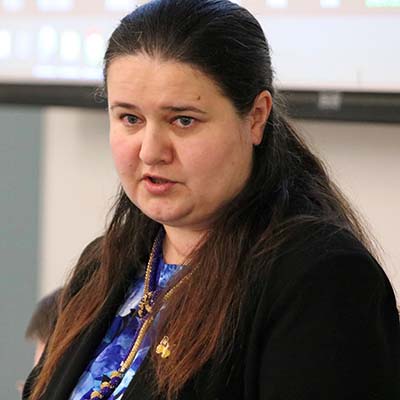In This Story

Although now the main focus in the Russian war against Ukraine is on the war itself and Ukraine’s fight for independence, the best economists gathered together at George Mason University’s Van Metre Hall at Mason Square in Arlington, Virginia, to discuss Ukraine’s post-war future.

The event, sponsored by the Center for Micro-Economic Policy Research at the Schar School of Policy and Government, looked at the new book Rebuilding Ukraine: Principles and Policies. The panelists, including the authors and editors of the book, and 50 attendees welcomed special guest Ambassador Extraordinary and Plenipotentiary of Ukraine Oksana Markarova joining them in the discussion. Schar School postdoctoral fellow Solomiya Shpak moderated the event.
“After we win the war, we need to win the peace,” Markarova said, indicating Ukraine’s fight will only begin after the war. Referencing President Volodymyr Zelenskyy’s formula of peace, created in September 2021, she reminded those in attendance that the war will be over not when the territories are restored but when Ukraine is rebuilt. In her speech, Markarova introduced the key objective of the day, subsequently mentioned by other panelists, which is building “Ukraine 2.0,” the new, better version of the country.
In his presentation, Yuriy Gorodnichenko, professor of economics at the University of California, Berkeley, introduced the book and presented key principles of Ukraine’s reconstruction, one of which was modernization. “We have to be very creative. We can’t use the existing infrastructure, we need to create new institutions to address the challenges,” Gorodnichenko said, encouraging the audience to come up with innovative ideas and reconstruct Ukraine together.
Joining the event via Zoom, Tatyana Deryugina, an associate professor of finance at the University of Illinois, Urbana-Champaign, covered challenges and opportunities in the energy sector. Power plants have recently been one of the major targets for Russia; currently, more than half of Ukraine’s energy infrastructure has been damaged or destroyed, requiring a variety of short- and long-term solutions. “Ukraine should continue synchronizing policies with Europe,” Deryugina said when discussing the EU’s Green Deal plan and supported strengthening the bonds with Western partners.
While admitting to corruption problems in the past, it is a priority for Ukraine to amend the system to raise effectiveness of the reconstruction, suggested Ilona Sologoub, the editor of VoxUkraine, who presented successful reforms implemented in the past and pointed to directions to work toward the future. Her key advice was to focus on monitoring and transparency and ensure anticorruption and legal institutions remain control.
Today, the World Bank estimates Ukraine’s physical damage at approximately $400 billion. The dire financial perspective was introduced at the event by Vladyslav Rashkovan, alternative executive director of the International Monetary Fund, who talked about how important it is to distribute the incoming funds not only to the capital Kyiv but to different hromadas (“communities”).
Building Ukraine 2.0 is a complex goal involving countless numerous actors: “Reconstruction is not only people but also institutions,” Rashkovan said, supporting his colleagues’ views on reforming the system.
